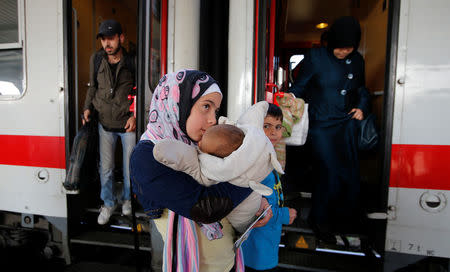Economy, incentives and migrants give Germany baby boom
BERLIN (Reuters) - More babies were born in Germany in 2016 than in any year since 1996, thanks to a booming economy, government incentives and a surge in migration, data showed on Wednesday. Europe's biggest economy and its public pension system are struggling with a rapid aging of the population. In an effort to boost the birth rate, the government has expanded maternity and paternity benefits as well as childcare in the last decade. Chancellor Angela Merkel's decision in 2015 to welcome more than a million refugees, mainly from war zones in Syria and Iraq, has also been described as a demographic game changer. The Federal Statistics Office said 792,131 babies were born in Germany in 2016, up 7 percent on the year before, and the highest number since 1996. Women between 30 and 37, who had fewer children when they were younger, are now catching up due to favorable economic conditions and family incentives, it said. Germany is enjoying an unusually prolonged growth cycle, now in its ninth year, as record employment and ultra-low borrowing costs propel a consumer-led upswing. But while births to German citizens were up 3 percent to around 607,500 babies, the rise was far outstripped by births to citizens of other countries, up a huge 25 percent at 184,660. "The number of women from countries with a traditionally high birth rate has risen," the office said. A breakdown of the data showed the number of Syrian babies nearly quadrupled to 18,500, those with Iraqi mothers doubled to 5,500 and those with Afghan mothers tripled to 5,900. The overall fertility rate - the average number of children a woman has in her lifetime - rose to 1.59 from 1.50 in the previous year, the highest level since 1973. But although the rate among German women edged up slightly to 1.46 children, that among foreign women was more than 50 percent higher at 2.28. Despite the rise in births and immigration, experts still estimate that Germany's working-age population, whose pension contributions support the growing number of retirees, is likely to shrink in the next decade. The average fertility rate in the European Union is 1.60, according to the EU statistics office, Eurostat. France has the highest, with 1.92, and Spain and Italy the lowest, with 1.34. (Reporting by Michael Nienaber; Editing by Kevin Liffey)



